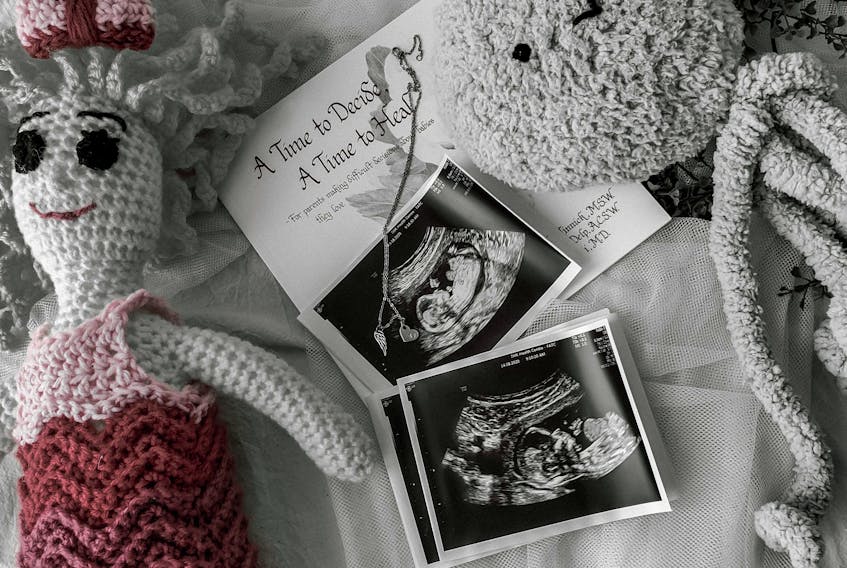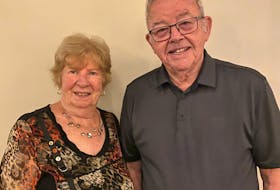The day Kayla Ellis learned her pregancy wasn't viable was the worst day of her life.
When she found the courage to talk about it, she was met with overwhelming community support.
"I'm just so glad that we can have this really hard, awful conversation together," she said.
The child Ellis lost would have been her second. She wasn’t even sure she’d try for another child after she battled postpartum anxiety with her first, Ivy.
“I couldn’t even fathom it,” said Ellis.
But, after recovering with the help of therapy, she did try, and became pregnant again – another girl, which she named Fleur Lila.
In mid-July 2020, at 11 weeks, she had her first appointment with an obstetrician. Ellis was told her baby was growing fine, and she was healthy.
The next day, though, she got a call from the Prince County Hospital. They told her to come in for another ultrasound.
“I’ve already had a child and I kind of know how this stuff goes,” said Ellis. “I knew something was off.”
Something was, in fact, “off,” but the ultrasound technician wasn’t able to tell Ellis any specifics.
When the appointment concluded, she returned to her car in hysterics, waiting until she regained her composure before driving home.
The hospital wasn’t far behind her when the doctor’s office called. Over the phone, sitting in her car at the side of the road, Ellis learned what was happening to her child.
Fleur’s intestines were outside of her body; she would need emergency surgery immediately after birth.
"You can’t process that.”

For 11 days, Ellis waited for a call from the IWK children’s hospital in Halifax. In the meantime, she searched the internet for everything she could, trying to narrow down what, exactly, was Fleur’s predicament.
“I was just praying that it was gastroschisis,” she said. “It’s fixable, and the baby will live a completely normal life and the baby will be fine.”
She had her appointment in Halifax on Aug. 7.
Because of COVID-19 restrictions, she went inside alone. Outside in the IWK’s gardens, her husband and daughter could do nothing but wait.
Ellis was full of anxiety, but the staff helped ease her nerves. They assured her she wouldn’t leave the building without having all her questions answered.
Fleur wasn’t, in fact, affected with gastroschisis. Her abdomen, from the ribcage down, never closed. All of her organs, except her heart and lungs, were outside her body.
The pregnancy wasn’t viable.
Ellis went numb. Her world seemed to stop.
“My husband and my daughter are downstairs. It’s summer, so it’s beautiful,” she said. “They’re in the beautiful garden … blissfully down there, thinking everything is going to be okay.”
A week later, Ellis had an appointment to terminate the pregnancy. Although Ellis and her husband knew it was the right thing to do, she said it was the hardest decision she’s ever had to make.
“To this day, it’s still a battle in my head to not torture myself with ‘what if.’”
The IWK gave Ellis’ husband permission to be with her in the hospital while she filled out the paperwork, but he couldn’t be present for her surgery.
“He never got to see Fleur. He got to see a picture of the ultrasound, but he never got to see her move around,” said Ellis. “He couldn’t even be there for me for the operation, or right there when I woke up. It must have just been hell.”
After the surgery, Ellis felt hollow. She cried for hours. Fleur had been growing for 15 weeks. Ellis had already had a slight bump, which she’d been rubbing and telling her unborn daughter she was sorry.
“It was the longest four, five, six hours of my life.”

MAKING A DIFFERENCE
“This is a story of loss that threw me into some very dark months,” reads the first of five long, difficult posts on Ellis’ social media.
They were posts she spent months contemplating writing, but it wasn't until December that she finally felt comfortable enough to do so.
But, she said, she didn't do it for herself.
She posted to her Facebook and Instagram pages for everyone who had been where she was. For who felt they had to stay silent.
“There’s so much stigma here, especially in West Prince, when it comes to making these decisions,” she said. “I thought, maybe if I shared my story, it would help even one other mother who has gone through this loss, or had to make that decision, feel … a little bit of comfort.”
Jan Skeffington, acting manager of the Women’s Wellness Program and Sexual Health Services at the Prince County Hospital in Summerside, said everyone who loses a pregnancy has a different experience. There’s no one correct way to grieve.
“People may feel numbness, confusion, shock, sadness, exhaustion… all kinds of emotions, even depression, after a loss,” said Skeffington.
Loneliness is a common emotion, she said, especially when someone who has miscarried feels as though they can’t open up.
Talking about a pregnancy loss may not be helpful for everyone, but Skeffington said that more people reaching out and speaking up, even just to close friends and family, can help eliminate the stigma.
Although Ellis lost her pregnancy, she has some mementos to keep Fleur’s memory alive.
Her mother-in-law crocheted a small stuffed octopus that would have gone in Fleur’s NICU cradle, back when Ellis suspected gastroschisis.
Ellis also has a small silver necklace, with a wing, a heart and engraved baby footprints. It was a gift from her mother.

In honour of Fleur and to thank those who helped her through a difficult time, Ellis, who owns Birch Studio, used her business to raise funds for the IWK.
She put a few items up for auction at 7 p.m. on Dec. 23, expecting to raise a few hundred dollars; she would have been happy with $50.
When bidding closed two and a half hours later, Ellis raised $1,315. Many people messaged her asking if they could donate outside of the auction.
‘It blows me away,” said Ellis. “I feel so lucky to raise our daughter in such a caring community that, when you are down, you can lean on so many other people to bring you back up.”
By the time Ellis wrote the cheque on Jan. 5, she raised almost $4,000 for the IWK’s Fetal Assessment and Treatment Center.
“That makes you realize this is so much bigger than just Fleur,” she said. “I’m so thankful to the support that I have been shown and given, and I just wish that I could give that right back to them.”
Support for women going through pregnancy loss:
- Women’s Health and Wellness Centre
- Employee Assistance Program
- Private therapy
- Family Service P.E.I.
- Canadian Mental Health Association
- Community Mental Health
Kristin Gardiner is the Journal Pioneer's rural reporter.









